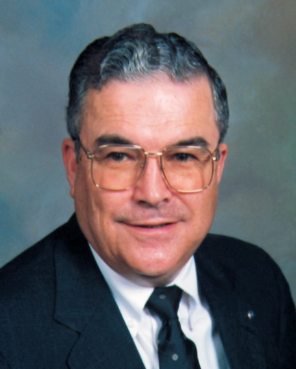
Repairing the Body with Glass
Dr. Delbert Day, B.S., M.S., Ph.D., Curators Professor Emeritus in Materials Science and Engineering
Delbert E. Day is Curators’ Distinguished Professor Emeritus of Materials Science and Engineering, Senior Investigator, and former Director, Graduate Center for Materials Research, at Rolla and former Chairman, President/Chief Executive Officer, and cofounder, Mo-Sci Corporation. In 1971, he was named the Nation's Outstanding Young Ceramic Engineer by the National Institute of Ceramic Engineers and in 1973, he was elected a Fellow of the American Ceramic Society. In 1980, he received the MSM/UMR Alumni Merit Award, and in 1996, he received the Presidential Award for Research and Creativity from the University of Missouri. In 1998, the Governor of Missouri appointed him a director of the State of Missouri Technology Corporation. He is also a past-president of the American Ceramic Society. Day has been an exemplary glass scientist, teacher, entrepreneur, and philanthropist who has transformed the lives of countless people through his groundbreaking discoveries and service.
Dr. Day has had a prolific career as one of the pre-eminent glass scientists in the world, with over 400 peer-reviewed publications. He holds 69 U.S. and international patents dealing with biological uses of glass, glass microspheres for radiation therapy, glass to metal sealing glasses, ceramic dental materials, oxynitride glasses, refractories, and optically transparent composites. He mentored more than 70 M.S. and Ph.D. graduate students in Materials Science and Engineering and he won numerous awards for teaching, scholarship and education of the next generation of glass scientists. For his scientific contributions, he was elected in 2004 to the National Academy of Engineering—the most prestigious award accorded to engineering-related scientists in the U.S.— and he was elected a Fellow of the National Academy of Inventors in 2017. Through his research on specialty glasses, Day developed glass-bead TheraSpheres™, a liver cancer treatment available at more than 200 sites worldwide for the treatment of inoperative liver cancer. The treatment consists of injecting millions of radioactive glass beads—each one about one-third the diameter of a human hair into the main artery supplying blood to the liver. The radioactive beads eradicate the cancer by delivering localized radiation to the malignant tumors without harming the surrounding healthy tissue. With his most recent endeavor, Day is having a profound impact on healthcare for people suffering with chronic, nonhealing wounds. Day developed a wound dressing that features a glass mat and causes chronic wounds to heal in days or weeks. This fast healing happens even for people who have suffered open wounds for years.

Follow Chemistry